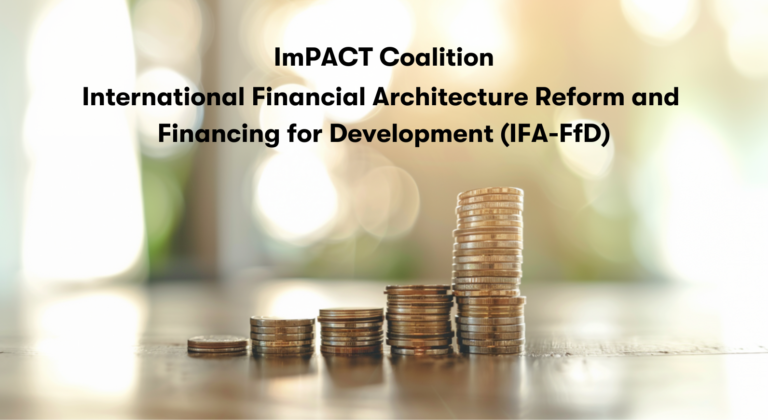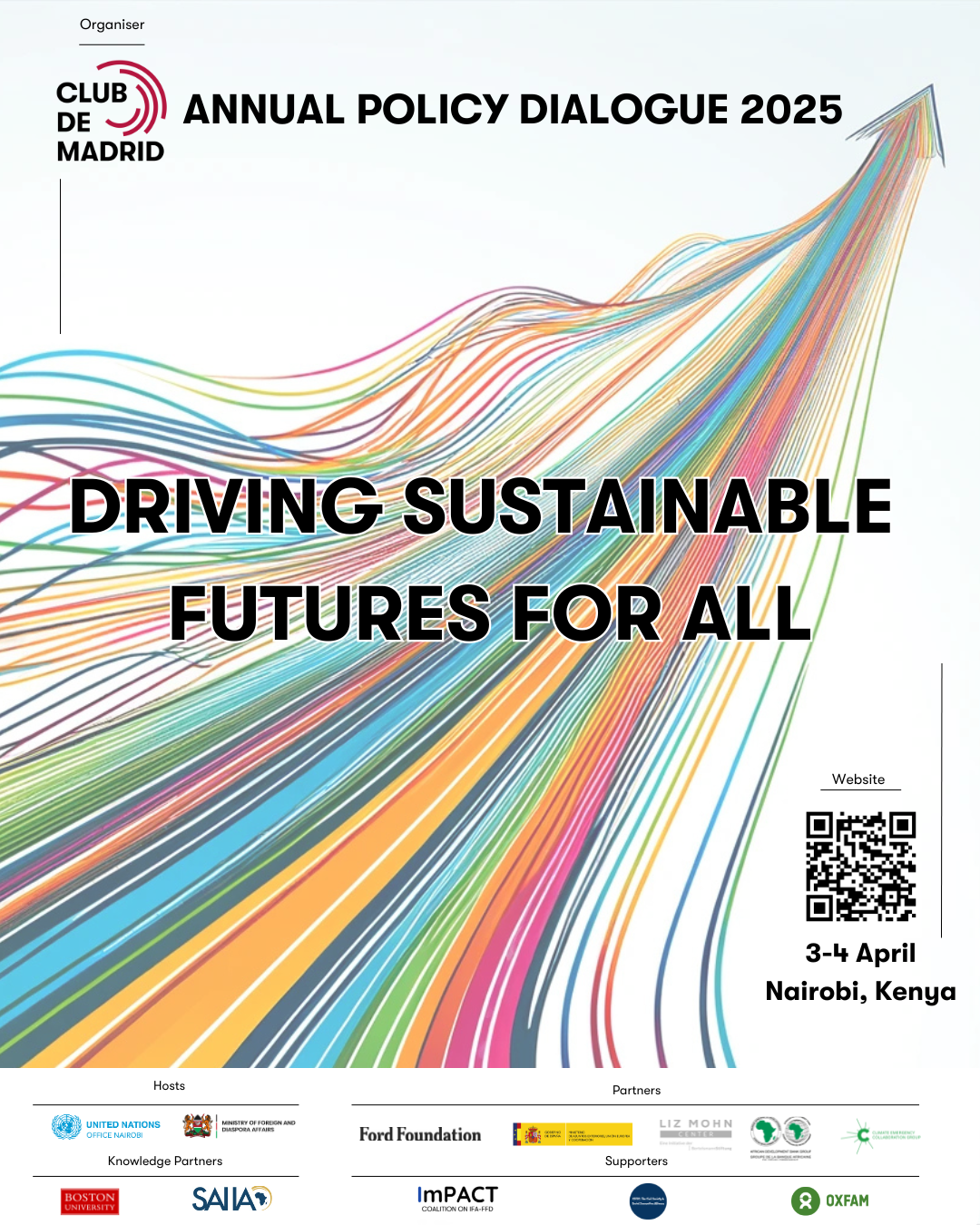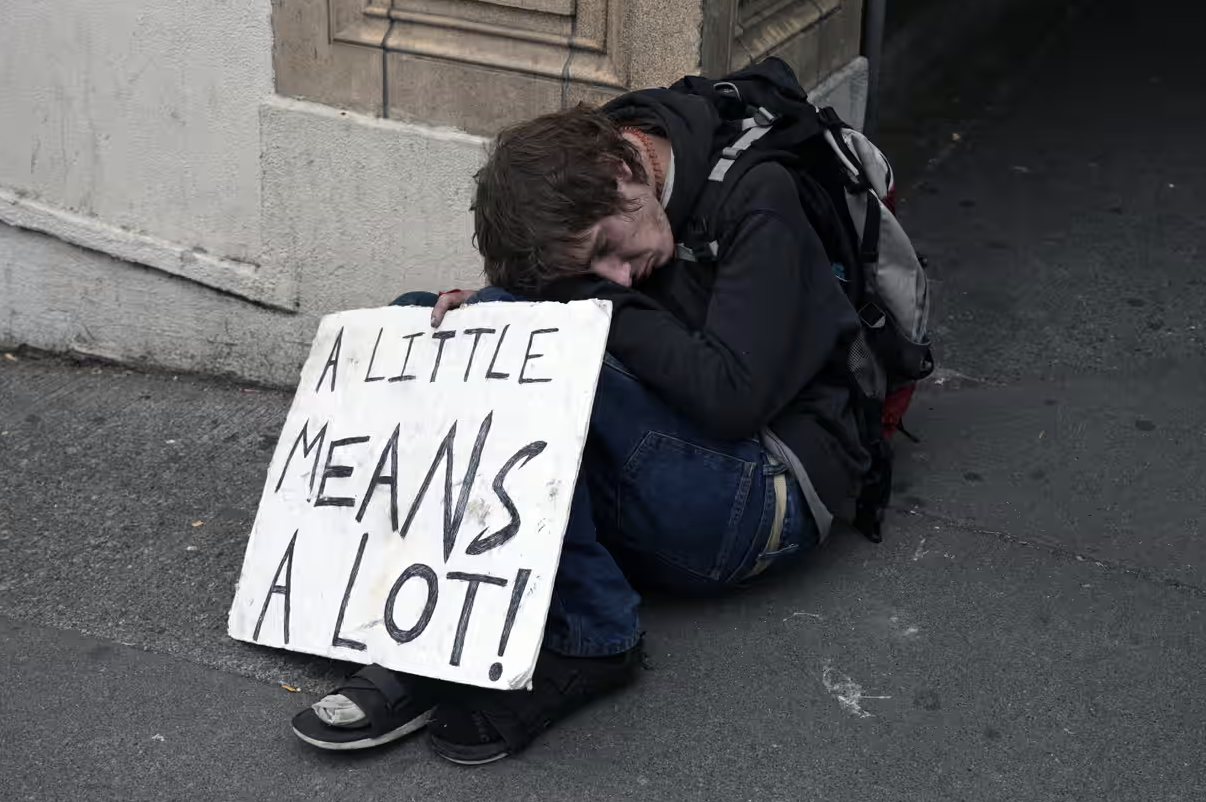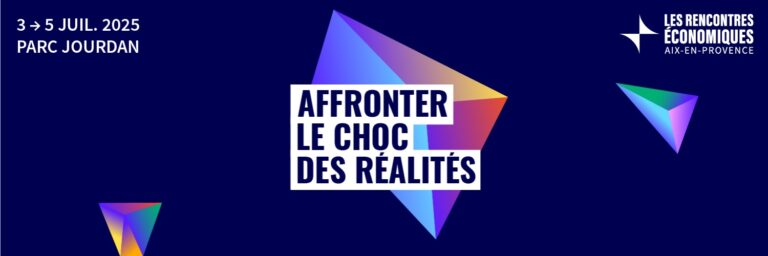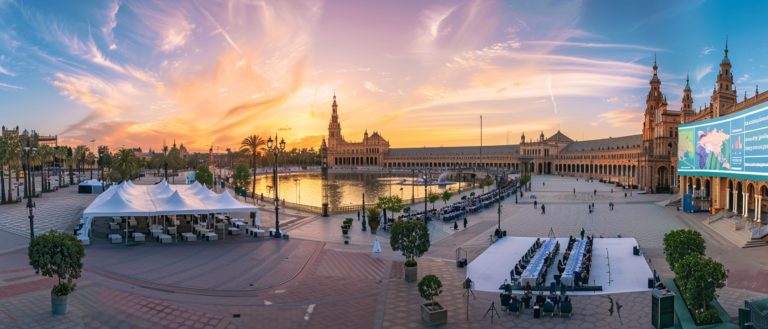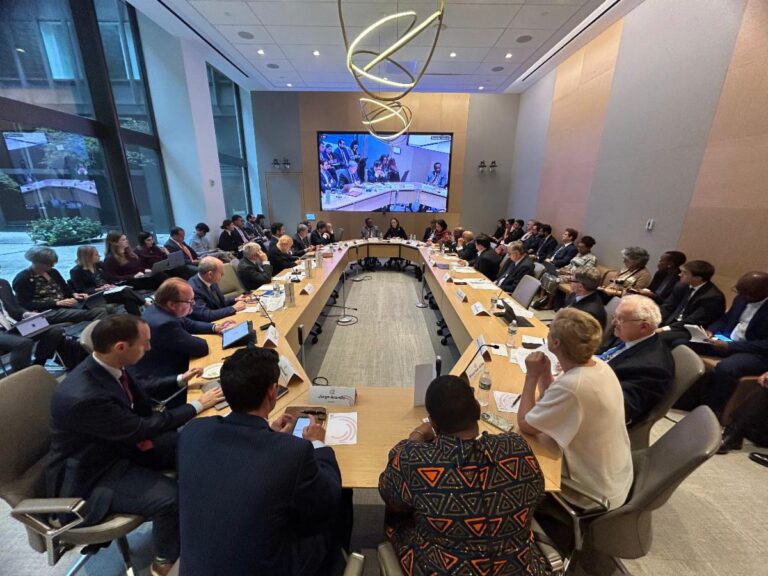A Strategic Commitment to a Sustainable and Equitable Future – delivering measurable progress via multilateral solutions, equitable finance, and policy-driven transformation.
Club de Madrid is advancing a bold agenda on Financing for Development, grounded in the conviction that a fairer, more inclusive and effective international financial architecture is essential to tackling the major global challenges of our time. Adequate, stable and sustainable financing is a prerequisite for eradicating poverty, addressing climate change, reducing inequality and fostering resilient democratic societies.
While the international community has acknowledged this imperative progress has been uneven and insufficient. The current global financial system is marked by deep asymmetries that fails to respond to the needs of countries with fewer resources and hinder their ability to respond to multiple, overlapping crises. Structural challenges such as sovereign debt distress, limited liquidity, unfair tax practices and the underutilisation of private capital for development persist and must be addressed.
In this context, Club de Madrid contributes through a threefold approach: strategic analysis, political dialogue, and action-oriented policy recommendations. Leveraging the experience and legitimacy of its Members — democratic former Presidents and Prime Ministers — the organisation facilitates inclusive deliberative spaces that foster political consensus on the need to reform global financial governance and channel resources towards collective well-being.
Our work is structured around several interconnected priorities: reforming international financial institutions; ensuring sovereign debt sustainability; enhancing international tax cooperation; mobilising responsible private finance; and expanding financial inclusion through technology and innovation. In each of these areas, Club de Madrid promotes transformative, evidence-based proposals, grounded in regional diversity, multilateral cooperation and a strong commitment to sustainable development and human rights. Financing is a reflection of political will and global solidarity. Club de Madrid remains committed to ensuring that financial decision-making responds to the needs of people and the planet, contributing to a more just, resilient and democratic global future.
ACTIONS

On the closing day of the Fourth Financing for Development Conference, Global Public Investment Network and Club de Madrid announced a new government-led initiative for global public investment at the Sevilla Platform for Action. This marks a bold step toward reshaping how the world finances solutions to shared global challenges.
Global public investment could remake international financing by 2028

The programme for the 25th Rencontres Économiques d’Aix-en-Provence, which took place from Thursday 3 to Saturday 5 July 2025, focused on the theme “Facing the shock of reality”. This anniversary edition also featured four major new developments. Carlos Alvarado, Dalia Grybauskaitė and Maria Elena Aguero will attend it.
Europe’s largest economic forum faces the shock of reality
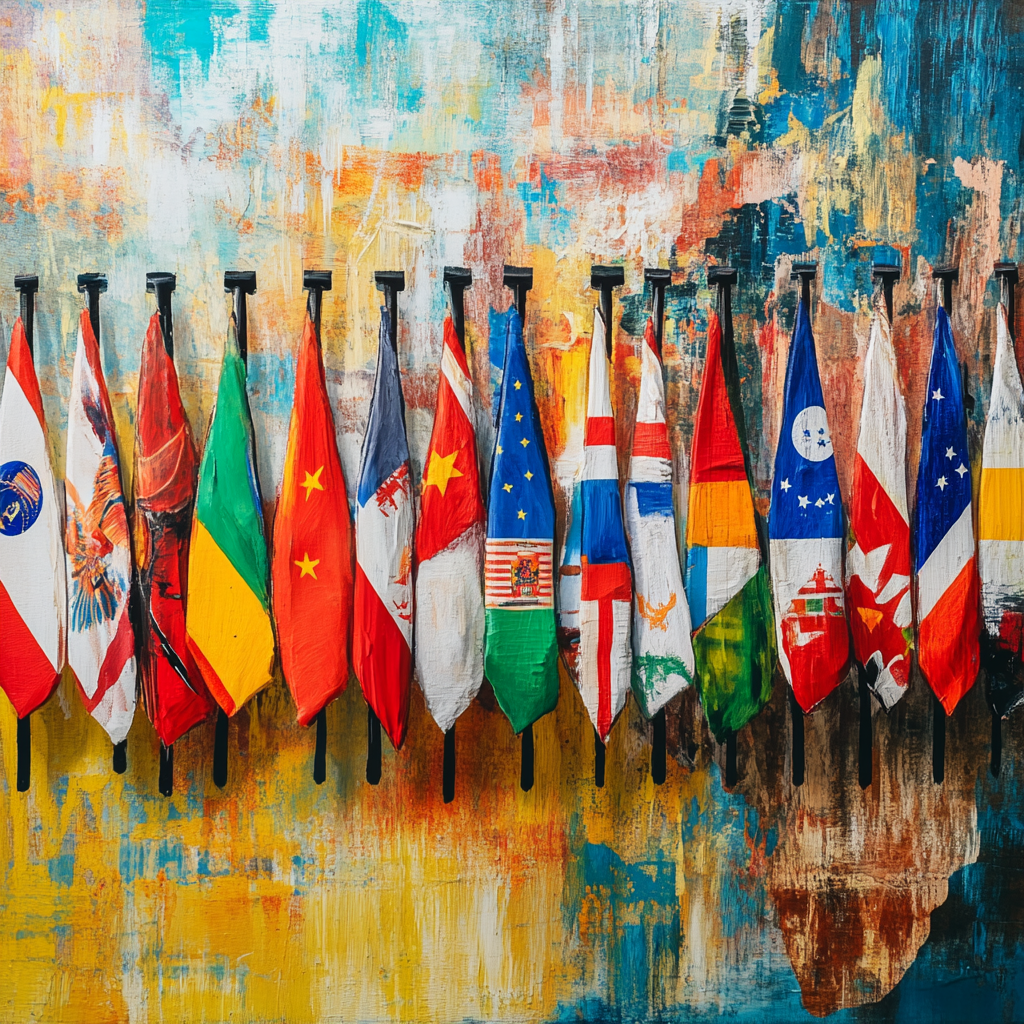
Forty former Heads of State and Government are calling for a new economic coalition of the willing to urgently address inequality and rebuild the global economic system. In a joint letter released ahead of the Fourth International Conference on Financing for Development in Seville, they urge restoring development aid, comprehensive debt relief, international tax cooperation, and ambitious reforms to an outdated global financial architecture.
The letter, organised by Club de Madrid with support from Oxfam and the People’s Medicines Alliance, warns that multilateral cooperation is in crisis, compounding poverty, inequality, and environmental breakdown, while “trillionaires could emerge this decade as nearly half of humanity lives in poverty.”
The leaders call for “inequality-busting financing”—including fair international taxation on wealth and multinationals, coordinated debt relief, and trade cooperation that raises labor and environmental standards. They highlight FfD4, the G20 in South Africa, and COP30 in Brazil as key opportunities to advance a fairer global economy that serves people and planet.
Club de Madrid Members rebuke “narrow unilateralism” and call for nations to urgently join forces to combat inequality

Ahead of the Fourth Financing for Development Conference in Sevilla, a coalition of governments and civil society is advancing Global Public Investment (GPI): a bold approach where all contribute, all benefit, and all decide to tackle global challenges together.
Led by the Global Public Investment Network, with Club de Madrid, CAF, and the Government of Colombia, the initiative will launch on 3 July at the conference’s Sevilla Platform for Action, with a preview event on 2 July.
With growing support from over 50 civil society organisations, renowned economists, and the G20, GPI is moving from a powerful idea to a practical plan, reshaping global financing to serve people and planet.
Global Leaders Unite to Champion Global Public Investment to Tackle Common Global Challenges
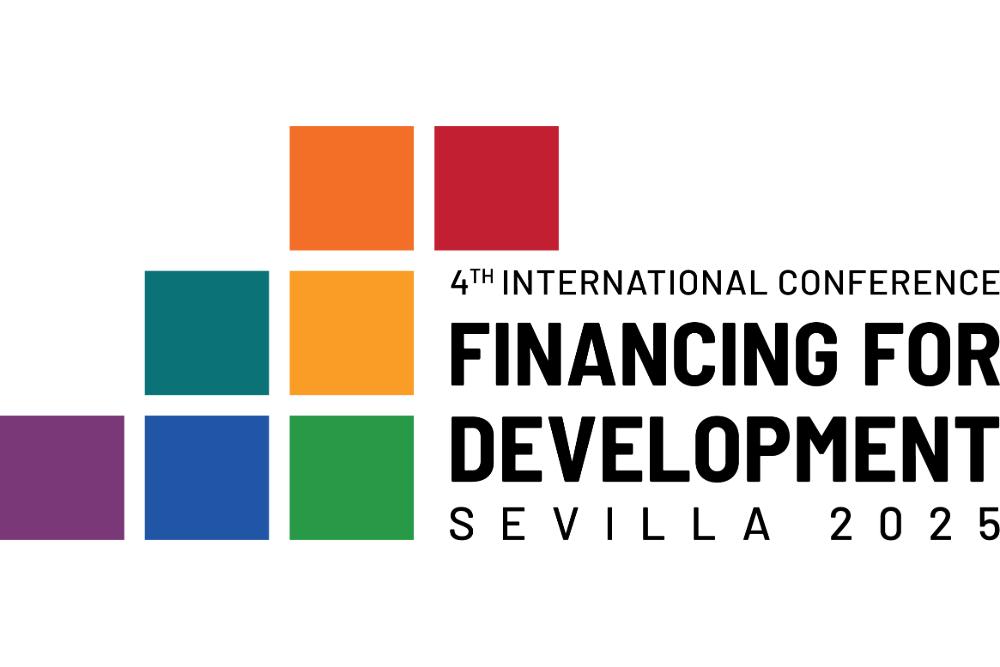
Club de Madrid will actively engage at the Fourth International Conference on Financing for Development in Seville advocating for a fairer more resilient and sustainable global financial system that addresses inequality and the climate crisis
The organization will co-host and join key events including a high-level dialogue with Oxfam on development in an age of extreme inequality a side event on financing an equitable fair inclusive and resilient future and the launch of a Global Public Investment initiative under the Sevilla Platform for Action promoting a multilateral approach to financing development
Club de Madrid will bring the voices of democratic former Heads of State and Government to these discussions highlighting that transforming the international financial architecture is essential to achieving the SDGs and ensuring a fairer future for all
Club de Madrid at the 4th International Conference on Financing for Development (FFD4)
The ImPACT Coalition on International Financial Architecture Reform and Financing for Development (IFA-FfD) is a co‑led initiative by Club de Madrid and the Global Public Investment Network, born at the 2024 UN Civil Society Conference in Nairobi. It convenes over 60 civil-society organizations and Member States to drive bold reforms in global finance—focusing on multilateral funding for the SDGs, sovereign debt relief mechanisms, inclusive international tax policies, and improved governance of institutions like the IMF. With a view toward the Fourth International Conference on Financing for Development in Seville (30 June–3 July 2025), IFA‑FfD promotes practical policy recommendations and inclusive dialogue to ensure sustainable, equitable financing for both people and planet
International Financial Architecture Reform and Financing for Development (IFA-FfD)

At the African Development Bank Annual Meetings in Abidjan on May 27, leaders convened to shape Africa’s digital transformation. Highlighted was the continent’s immense potential—18% of the world population but under 1% of data center capacity—and the pivotal role of domestic resources like taxes, savings, and remittances in funding digital progress.
Speakers stressed the urgent need for strong institutions, regulatory frameworks, and public-private partnerships to ensure tech development is inclusive, democratic, and green. Success stories include youth-led tech growth, mobile money innovations like M‑PESA, and AI applications improving governance.
Club de Madrid Members reaffirmed that true digitalisation must serve institutional strengthening, digital rights, and universal access—making it not just an economic tool, but a pillar of democratic governance and social trust.
Africa in Control of Its Digital Future: Mobilising Domestic Resources and Strategic Partnerships for Inclusive Transformation
Club de Madrid Annual Policy Dialogue 2025: International Financial Reform – Driving Sustainable Futures for All
On 3–4 April 2025 in Nairobi, Club de Madrid convened expert former Heads of State, scholars, civil society, and private sector leaders to explore how international financial reform can accelerate sustainable development. The dialogue focused on three priority areas:
• Scaling up and reforming Multilateral Development Banks for greater resources and operational agility
• Reforming sovereign debt mechanisms to support sustainable growth
• Enhancing international tax cooperation to address inequities and finance the SDGs
This annual gathering informed global processes—from the UN FfD Forum and Summit of the Future, to G20 presidencies and the FfD4 conference—by producing practical policy recommendations and amplifying democratic leadership in international finance.
Annual Policy Dialogue in Nairobi (Kenya) 2025 – International financial reform: Driving Sustainable Futures for All

Tropical Forests Are Essential: Safeguarding Biodiversity, Climate, and Livelihoods
Club de Madrid underscores the critical role of tropical forests in absorbing CO₂, regulating the climate, protecting global biodiversity, and sustaining the cultural and economic livelihoods of local communities. Covering just 3% of the planet’s surface yet home to over 50% of the world’s species, tropical forests are vital carbon sinks in the fight against climate change.
Despite their importance, tropical forests face severe threats from deforestation, fragmentation, and climate impacts. Club de Madrid calls for sustainable forest management, stronger institutions, clear regulatory frameworks, and partnerships that place local communities at the center of preservation efforts, ensuring forests continue to protect the planet while advancing development.
Tropical Forests are Essential
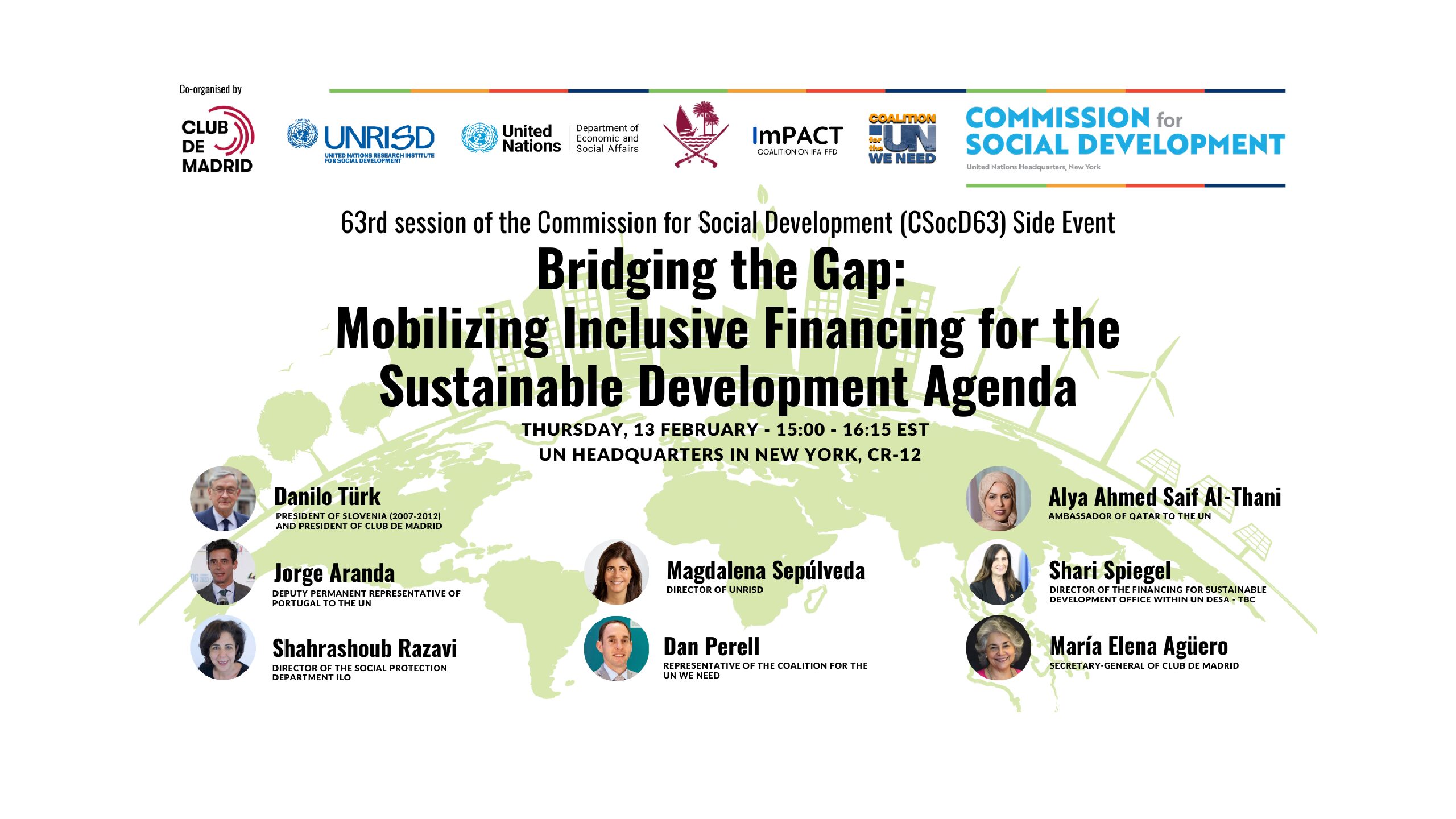
During the 63rd Session of the Commission for Social Development (CSocD63) session this impactful side event will take place. The event will ignite a bold and dynamic dialogue on aligning the agendas of the Fourth International Conference on Financing for Development (FfD 4) and the Second World Summit for Social Development (WSSD2).
Bridging the Gap: Mobilizing Inclusive Financing for the Sustainable Development Agenda
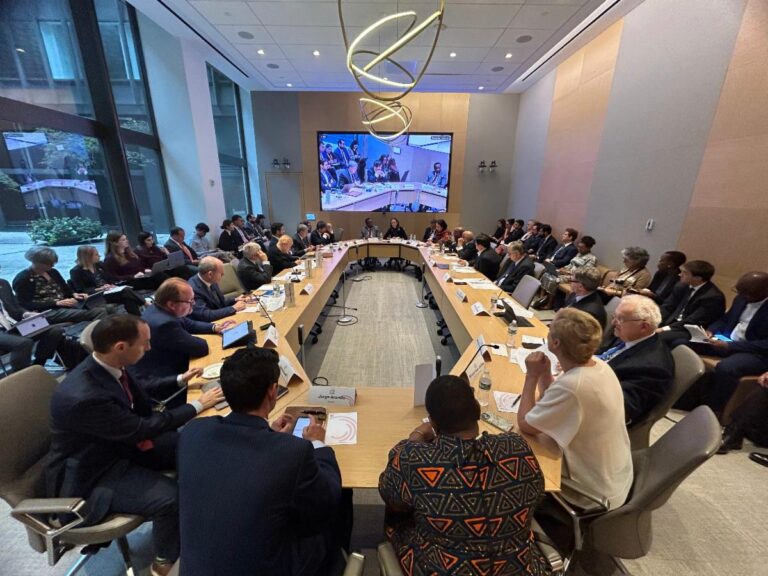
Our Members, Advisors and participants of the WYDE Network of Young Decision-makers travelled to New York to advance Club de Madrid programming and share key messages during UNGA week.
UNGA 2024: Financing for Development
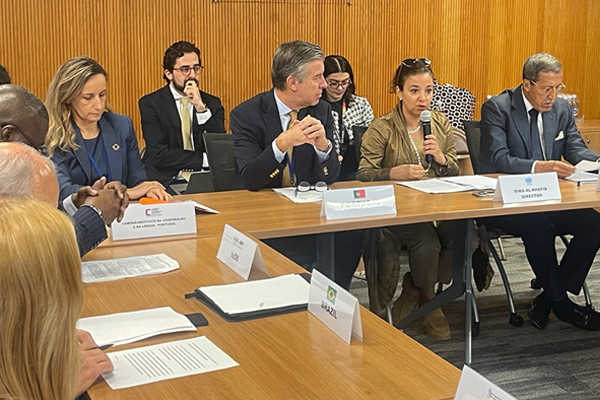
UN Member States reaffirmed their commitment to the 2030 Agenda for Sustainable Development, emphasizing the importance of triangular cooperation and adequate financing to accelerate progress towards the Sustainable Development Goals (SDGs).
Accelerating SDG Progress Through Financing of Triangular Cooperation
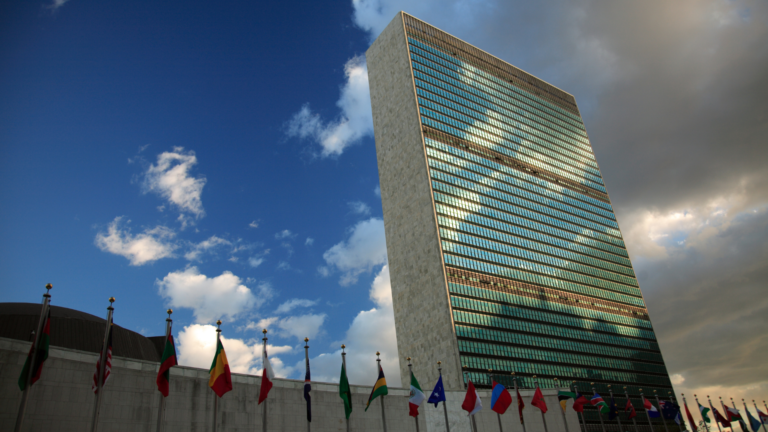
Pact for the Future and Beyond: Towards the 4th International Conference on Financing for Development
Held during the 2024 Summit of the Future, this side event brought together UN actors, governments, and civil society to reflect on progress made under the Pact for the Future, particularly on reforming the global financial architecture. Co-organized by the Club de Madrid and the ImPACT Coalition, it helped shape priorities for the upcoming FfD4, advancing calls for a more inclusive, resilient, and sustainable international financial system.
Summit of the Future Action Days: ImPACT Coalition for International Financial Architecture -Financing for Development (IFA-FfD)
NEWS
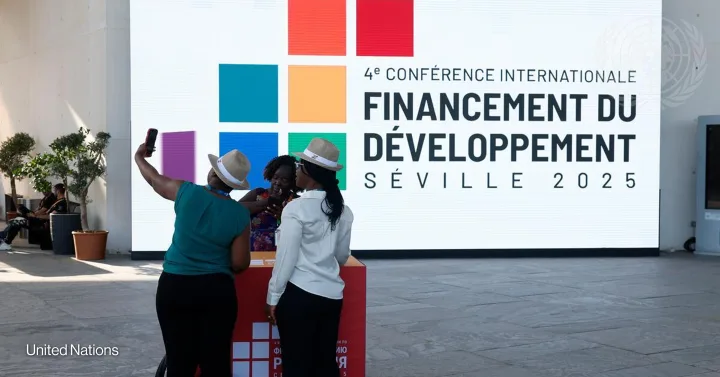
DEVEX – From June 30 to July 3, government heads, business leaders, and U.N. reps pushed new initiatives on debt, aid, and development finance — setting the norms, or at least, the hopes, for the next 10 years.
FfD4 special edition: The key takeaways from four days in Sevilla
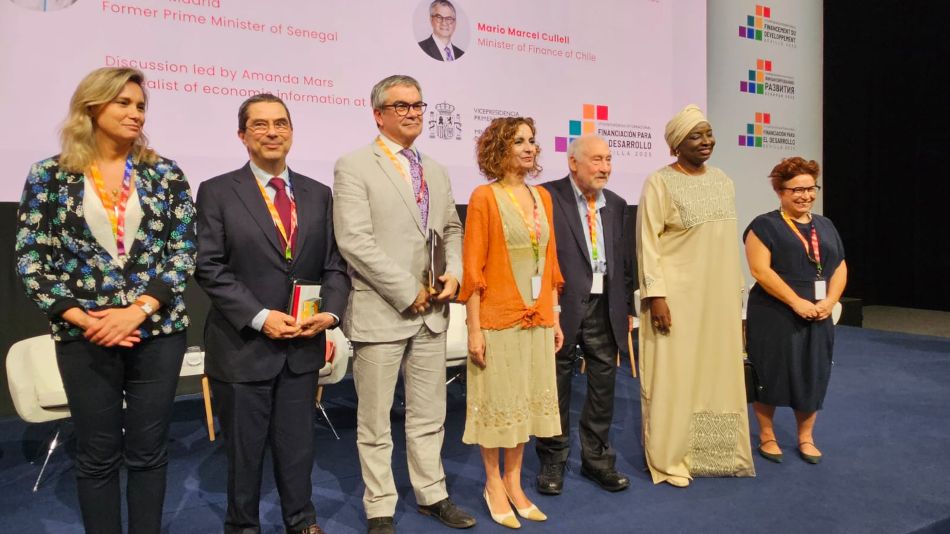
MINISTERIO DE HACIENDA | GOBIERNO DE ESPAÑA – La vicepresidenta primera del Gobierno y ministra de Hacienda ha participado en un Evento Especial de la ONU en Sevilla sobre Sistemas Tributarios Justos y Administración Tributaria eficiente para un desarrollo inclusivo y sostenible
Montero defiende que los sistemas fiscales de todo el mundo sean progresivos para favorecer la lucha contra la desigualdad
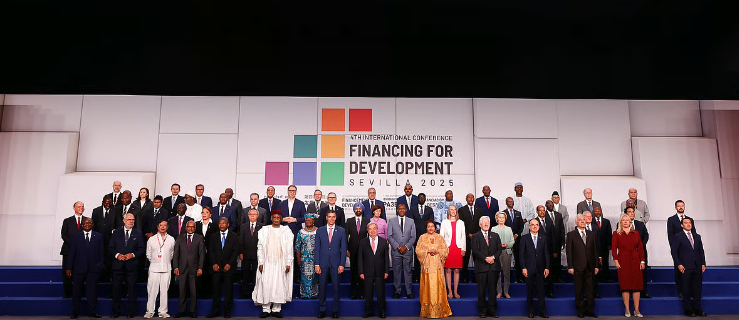
DOWN TO EARTH – The fourth International Financing for Development Conference (FfD4) in Spain has reached the midway mark. The first two days have been eventful and filled with a packed agenda. While leaders and heads of state gave high-level statements in the opening plenaries on the first day, spanning well over three hours, various side events on specific topics were conducted parallely.
FFD4 Seville: What are the links to the climate talks and the road from Seville to COP30 at Belem?

LA REPÚBLICA – Como parte de la delegación del Club de Madrid, el expresidente Carlos Alvarado participará desde ayer y hasta el jueves en la IV Conferencia Internacional sobre Financiación para el Desarrollo (FfD4), convocada por la Organización de las Naciones Unidas (ONU) y que se realiza en Sevilla, España.
Carlos Alvarado deende un desarrollo nanciero sostenible y con principios ecológicos
THE GUARDIAN – A coalition of 40 former presidents and prime ministers—including Gordon Brown, Helen Clark, José Ramos-Horta, and Óscar Arias—has issued a stark warning in The Guardian (26 June 2025)
They highlight a dangerous widening gap: while nearly half of humanity lives in poverty, some individuals are on track to become trillionaires this decade. The letter, coordinated by Club de Madrid alongside Oxfam and the People’s Medicines Alliance, criticizes outdated post-war economic frameworks and unilateral approaches, advocating instead for sweeping reforms—such as debt relief, fair international taxation, and IMF governance reform.
Signatories push for the creation of a new “economic coalition of the willing” to restore multilateralism, protect human rights, and leverage upcoming global events—like the Financing for Development conference in Seville, the G20 in South Africa, and COP30 in Brazil—to urgently reverse course.
The Guardian: Ex-world leaders call for ‘powerful shift’ as they warn of extreme inequality

INTER PRESS SERVICE – Ahead of the Fourth International Conference on Financing for Development (FfD4) in Seville (30 June – 3 July), José Antonio Ocampo calls for urgent reform of global financial systems to respond to today’s crises. With Sustainable Development Goals lagging and multiple intersecting global emergencies—economic, health, climate—international finance needs a transformation that centers on equitable, resilient, and inclusive mechanisms. The article argues that the current model, rooted in outdated structures, fails to deliver and that now is the moment to redesign funding frameworks to ensure fair access to resources, strengthen multilateral cooperation, and tap into shared responsibility for global wellbeing
Now is the Time to Remake International Financing
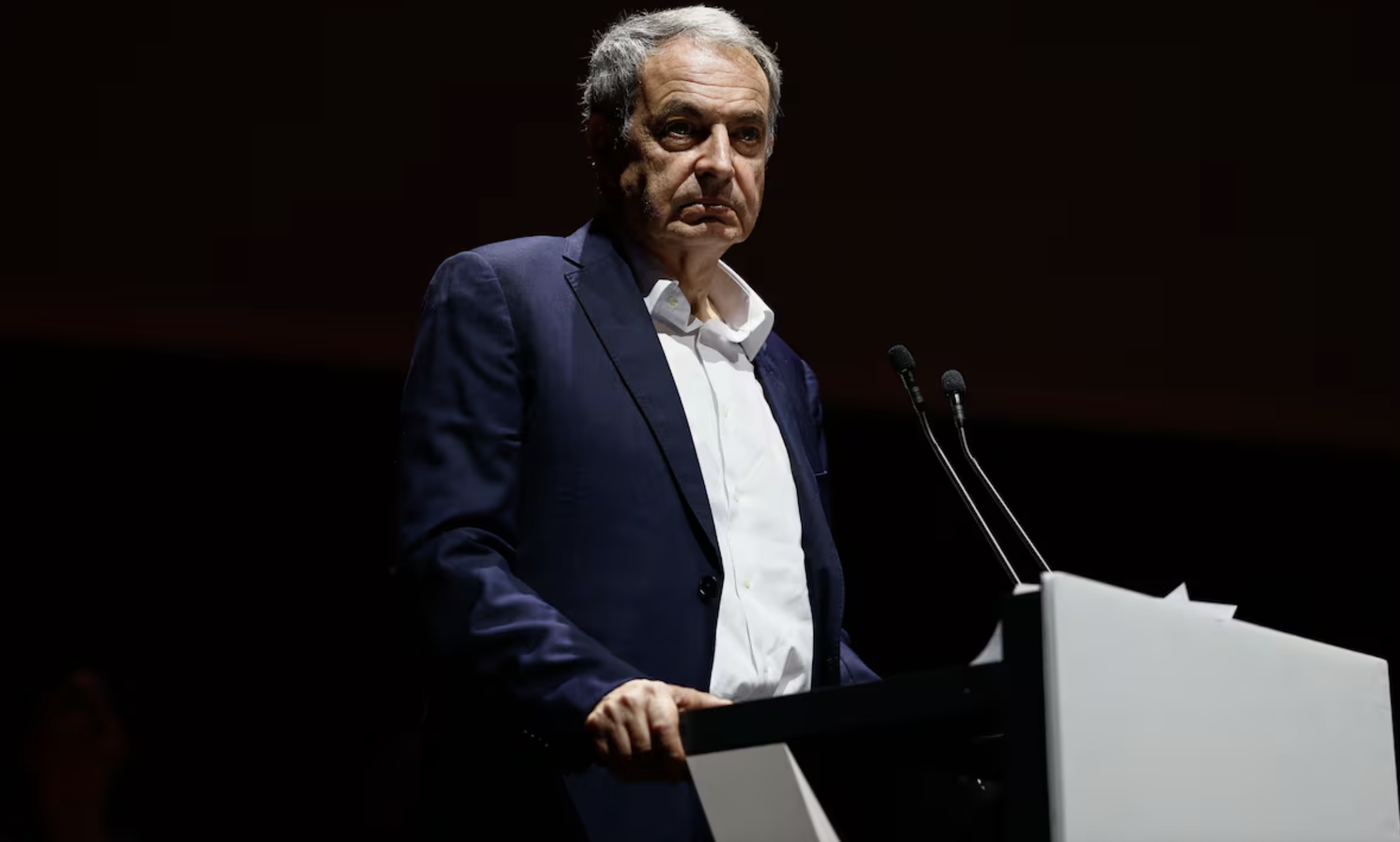
EL PAÍS – Ex-líderes mundiales alertan de que la desigualdad entre países está “desbocada” y piden medidas para combatirla. En una carta publicada antes del comienzo de la 4ª Conferencia Internacional sobre la Financiación para el Desarrollo de la ONU, antiguos mandatarios reclaman la necesidad de reforzar la cooperación internacional.
Ex-líderes mundiales alertan de que la desigualdad entre países está “desbocada” y piden medidas para combatirla

DEVEX – On the final day of the Financing for Development conference in Sevilla, negotiators laid the groundwork for long-term tax reform and new public-private cooperation — while calls for deep systemic change grew louder.
Sevilla reporter’s notebook Day 4: ‘Sevilla is about what comes next’
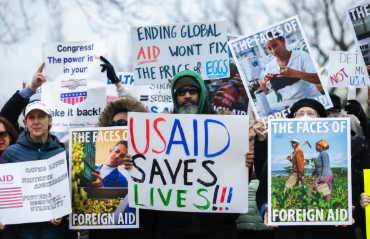
EL PAÍS – Representantes de más de 150 países se citan en Sevilla para discutir el futuro de la cooperación internacional en un mundo asolado por los conflictos, las crisis humanitarias y el ascenso de la extrema derecha
Más dinero para la guerra y menos para la paz: la última encrucijada para la ayuda al desarrollo
MORE
Voices of Leadership: Why We Must Talk About Development Finance Now | As part of Club de Madrid’s participation in FFD4, Members of the organization responded to the question:
Why is it urgent to talk about financing for development today, especially in the light of the decline of Official Development Assistance (ODA) and its impact on the most vulnerable countries?
Watch this short video featuring reflections from Michelle Bachelet and Moussa Mara
